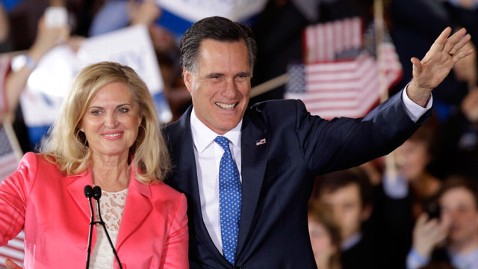Delegate Math Puts Romney Almost Halfway to GOP Nomination

(Image Credit: Stephan Savoia/AP Photo)
Rick Santorum likes to say it's barely halftime in the GOP race, and he's right.
After today's primaries in Washington, D.C., Maryland and Wisconsin, Mitt Romney will almost certainly have passed the halfway point toward the 1,144 needed to win the GOP nomination.
Romney (568) leads the delegate race with Santorum (273), Newt Gingrich (135) and Ron Paul (50) trailing, according to the latest ABC News delegate estimate.
A total of 98 delegates are at stake in today's three primaries. Romney is expected to win all three, with a relatively strong organization in moderate Maryland, a landslide straw-poll victory last week in establishment-heavy Washington and an NBC-Marist poll showing him ahead by 7 percentage points in Wisconsin, which figured to give Santorum his best chance of the three primaries today.
As Romney plods along in the delegate race, Santorum has repeatedly argued that the front-runner's perceived inevitability is being overblown. The "halftime" metaphor has become a central theme in Santorum's argument against GOP cohesion around Romney's bid.
"The race isn't even at halftime yet; we haven't even selected half of the delegates yet," Santorum said on Fox News Sunday. "Gov. Romney isn't even halfway to the magic number. We look at the calendar, and we feel very, very good about where we're going."
Santorum campaign manager Michael Biundo told the Milwaukee Journal Sentinel Monday, "It's kind of like Team Romney wants to go into the locker room at halftime and declare victory."
After today's primaries, 19 contests will remain out of 57 total (the 50 states plus American Samoa, Washington, D.C., Guam, the Northern Marinas, Puerto Rico and the U.S. Virgin Islands). Romney has won 21 contests so far, including the small territorial caucuses. Santorum has won 10, while Gingrich has won two. Santorum won Missouri's nonbinding primary, but Ron Paul appeared to perform better in its March caucuses.
Given that Romney has more than doubled Santorum's delegate haul, it's worth noting that Santorum will need a remarkable second-half comeback to win the nomination before the GOP's August convention in Tampa, Fla. Romney must win 46 percent of all outstanding delegates to win the nomination, while Santorum needs to win 69 percent.
To strain the sports metaphor even further, if Santorum and Gingrich both remain in the race, it's entirely possible the contest will go into overtime. Even if Romney wins every delegate awarded by every state left to vote - a virtual impossibility - he won't seal the GOP nomination until May 29, when Texas votes.
If Gingrich stays in the race, and if Santorum continues to win over social conservatives, it's likely Romney will win the nomination with support from the Republican National Committee's 126 super-delegates: the RNC members and state-party chairs who will vote as convention delegates by virtue of their party position, unbound to any candidate and able to support whomever they choose.
Thirty-three super-delegates support Romney, four support Gingrich, two support Santorum and one supports Paul, according to the Associated Press. Romney, however, has likely won the private backing of even more. Some RNC super-delegates back the former governor privately but are unable or unwilling to say so publicly because of state-party rules and other political entanglements that would be complicated by public involvement in the presidential primary, according to one super-delegate who supports Romney.